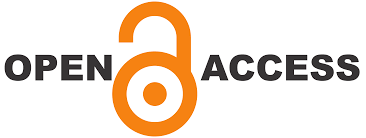Transformation of Early Childhood Education Curriculum: The Role of Digital Literacy in the 21st Century
Keywords:
Digital Literacy, Early Childhood Education, Socio-Cultural Context, Curriculum Framework, Policy AlignmentAbstract
This study examines the integration of digital literacy into early childhood education (ECE) through a socio-cultural and policy-aligned lens. Employing a qualitative document analysis and framework synthesis, policy documents from Indonesia and international organizations (UNESCO, OECD) were reviewed alongside research on child development and pedagogical innovation. Findings reveal that effective digital literacy implementation requires culturally responsive strategies, equitable access, and alignment with national and international policies. The proposed framework emphasizes staged integration, play-based learning, teacher competency, family engagement, and community partnerships. Practical implications highlight that digital literacy is a transformative component bridging theory and practice, fostering holistic child development and preparing children for the digital age. Challenges include infrastructure disparities, limited assessment tools, and privacy concerns, necessitating targeted policy interventions and professional development. This study provides actionable guidance for curriculum designers and policymakers to ensure inclusive and effective digital literacy adoption in ECE.
Downloads
References
Adara, R. A. (2020). Improving Early Childhood Literacy by Training Parents to Utilize Digital Storytelling. https://doi.org/10.2991/assehr.k.200808.039
Aggarwal, D. (2023). Exploring the Scope of Artificial Intelligence (AI) for Lifelong Education through Personalised & Adaptive Learning. Journal of Artificial Intelligence, Machine Learning and Neural Network, 41. https://doi.org/10.55529/jaimlnn.41.21.26
Alainati, S., Al-Hunaiyyan, A., & Alkhatib, H. (2023). Instructors’ Digital Competencies for Innovative Learning: Human Resource Management Perspectives. International Journal of Professional Business Review, 8(10). https://doi.org/10.26668/businessreview/2023.v8i10.3750
Anghelo Josué, Bedoya-Flores, M. C., Mosquera-Quiñonez, E. F., Mesías-Simisterra, Á. E., & Bautista-Sánchez, J. V. (2023). Educational Platforms: Digital Tools for the teaching-learning process in Education. Ibero-American Journal of Education & Society Research, 3(1). https://doi.org/10.56183/iberoeds.v3i1.626
Antón-Sancho, Á., Vergara, D., & Fernández-Arias, P. (2023). Impact of the Digitalization Level on the Assessment of Virtual Reality in Higher Education. International Journal of Online Pedagogy and Course Design, 13(1). https://doi.org/10.4018/IJOPCD.314153
Azzahra, F., Permana, H., Fitriani, L., Putri, R. M., & Wulandari, S. (2022). Approaches and models development of 2013 curriculum and merdeka curriculum. Curricula: Journal of Curriculum Development, 1(2). https://doi.org/10.17509/curricula.v1i2.52034
Beane, J. A. (2020). Integrative Curriculum. In Oxford Research Encyclopedia of Education. https://doi.org/10.1093/acrefore/9780190264093.013.1082
Boltsi, A., Kalovrektis, K., Xenakis, A., Chatzimisios, P., & Chaikalis, C. (2024). Digital Tools, Technologies, and Learning Methodologies for Education 4.0 Frameworks: A STEM Oriented Survey. IEEE Access, 12. https://doi.org/10.1109/ACCESS.2024.3355282
Brown, B. (2020). Children’s Right to Privacy on the Internet in the Digital Age. Pittsburgh Journal of Technology Law & Policy, 20(1). https://doi.org/10.5195/tlp.2020.238
Bulger, S., Elliott, E., Machamer, A., & Taliaferro, A. (2020). Teachers’ Perceptions of Professional Learning to Increase Classroom Physical Activity: Supporting School Policy Implementation. Excellence in Education Journal, 9(1).
Bush, T., & Sargsyan, G. (2020). Educational Leadership and Management: Theory, Policy, and Practice. Pedagogy And Psychology, 3(3). https://doi.org/10.24234/miopap.v3i3.255
Culatta, B. E., Setzer, L. A., & Hall-Kenyon, K. M. (2022). Incorporating Digital Literacy Materials in Early Childhood Programs: Understanding Children’s Engagement and Interactions. Handbook of Research on ….
Fatqurhohman, F., & Huda, H. (2025). Implementation of Articulate Storyline Learning Media in Cultivating Students’ Character in The Digital Era. AULADUNA: Jurnal Pendidikan Dasar Islam, 12(1), 11–22. https://doi.org/10.24252/auladuna.v12i1a2.2025
Fitriyah, Q. F., Qaidatiningsih, S. P., & Nafisah, S. O. (2023). Immigrant Digital Generation Teacher Efforts in Investing Digital Literacy in Early Childhood Education. Early Childhood Research Journal (ECRJ), 6(1). https://doi.org/10.23917/ecrj.v6i1.23021
Foster, N., & Piacentini, M. (2023). OECD Innovating Assessments to Measure and Support Complex Skills. OECDPublishing. https://doi.org/10.1787/e5f3e341-en
Ghonim, M. A., Khashaba, N. M., Al-Najaar, H. M., & Khashan, M. A. (2022). Strategic alignment and its impact on decision effectiveness: a comprehensive model. International Journal of Emerging Markets, 17(1). https://doi.org/10.1108/IJOEM-04-2020-0364
Goh, T. T., & Yang, B. (2021). The role of e-engagement and flow on the continuance with a learning management system in a blended learning environment. International Journal of Educational Technology in Higher Education, 18(1). https://doi.org/10.1186/s41239-021-00285-8
Handayani, I. N. (2022). Peran Orang Tua pada Pengenalan Literasi Digital untuk Anak Usia Dini di Era Teknologi Digital. Annual Conference on Islamic Early Childhood Education (ACIECE), 6.
Hardianti, A., Fatqurhohman, F., & Juliastuti, I. A. (2025). Media Pendidikan Matematika Penerapan Model Problem Based Learning Berbantuan Geogebra Untuk Meningkatkan Hasil Belajar Peserta Didik. JMPM: Jurnal Media Pendidikan Matematika, 13(1), 75–84. https://e-journal.undikma.ac.id/index.php/jmpm
Hendarwati, E., Nurlaela, L., & Bachri, B. S. (2021). The collaborative problem based learning model innovation. Journal of Educational and Social Research, 11(4). https://doi.org/10.36941/jesr-2021-0080
Huang, Z., Fey, M., Liu, C., Beysel, E., Xu, X., & Brecher, C. (2023). Hybrid learning-based digital twin for manufacturing process: Modeling framework and implementation. Robotics and Computer-Integrated Manufacturing, 82. https://doi.org/10.1016/j.rcim.2023.102545
Hurd, C. A., & Bowen, G. A. (2020). Attending to Outcomes, Relationships, and Processes to Advance Democratic Practices in Service-Learning and Community Engagement. International Journal for Research on Service-Learning and Community Engagement, 8(1). https://doi.org/10.37333/001C.18861
Joshi, M. (2023). Adaptive Learning through Artificial Intelligence. SSRN Electronic Journal. https://doi.org/10.2139/ssrn.4514887
Khilji, S. E. (2022). An Approach for Humanizing Leadership Education: Building Learning Community & Stakeholder Engagement. Journal of Management Education, 46(3). https://doi.org/10.1177/10525629211041355
Kieran, L., & Anderson, C. (2019). Connecting Universal Design for Learning With Culturally Responsive Teaching. Education and Urban Society, 51(9). https://doi.org/10.1177/0013124518785012
Kim, J.-E. (2024). Diagnosis of Digital Literacy Competence for Preservice Early Childhood Educators. Korean Association For Learner-Centered Curriculum And Instruction, 24(2). https://doi.org/10.22251/jlcci.2024.24.2.327
Kusmaryono, I., & Basir, M. A. (2024). Learning media projects with YouTube videos: a dynamic tool for improving mathematics achievement. International Journal of Evaluation and Research in Education , 13(2). https://doi.org/10.11591/ijere.v13i2.26720
Landers, C., Ormond, K. E., Blasimme, A., Brall, C., & Vayena, E. (2024). Talking Ethics Early in Health Data Public Private Partnerships. Journal of Business Ethics, 190(3). https://doi.org/10.1007/s10551-023-05425-w
Li, K. C., Wong, B. T. M., Kwan, R., Chan, H. T., Wu, M. M. F., & Cheung, S. K. S. (2023). Evaluation of hybrid learning and teaching practices: the perspective of academics. Sustainability (Switzerland), 15(8). https://doi.org/10.3390/su15086780
Liaw, S. Y., Choo, T., Wu, L. T., Lim, W. S., Choo, H., Lim, S. M., Ringsted, C., Wong, L. F., Ooi, S. L. W., Lau, T. C., Lee, U., Choi, H., Jeon, Y., Sweigart, L. I., Umoren, R. A., Scott, P. J., Carlton, K. H., Jones, J. A., Truman, B., … Fetters, M. D. (2021). Creating contextual learning experiences via virtual simulation. Clinical Simulation in Nursing, 21(3).
Lim, F. V., & Toh, W. (2020). Children’s digital multimodal composing: implications for learning and teaching. Learning, Media and Technology, 45(4). https://doi.org/10.1080/17439884.2020.1823410
Lombardi, D., Shipley, T. F., Bailey, J. M., Bretones, P. S., Prather, E. E., Ballen, C. J., Knight, J. K., Smith, M. K., Stowe, R. L., Cooper, M. M., Prince, M., Atit, K., Uttal, D. H., LaDue, N. D., McNeal, P. M., Ryker, K., St. John, K., van der Hoeven Kraft, K. J., & Docktor, J. L. (2021). The Curious Construct of Active Learning. Psychological Science in the Public Interest, 22(1). https://doi.org/10.1177/1529100620973974
Luo, W., Yang, W., & Berson, I. R. (2024). Digital Transformations in Early Learning: From Touch Interactions to AI Conversations. In Early Education and Development (Vol. 35, Issue 1). https://doi.org/10.1080/10409289.2023.2280819
Maharani, S. (2023). Trends in Mathematics Research in Early Childhood: Bibliometric Review. Jurnal Obsesi : Jurnal Pendidikan Anak Usia Dini, 7(4). https://doi.org/10.31004/obsesi.v7i4.4907
Mirata, V., & Bergamin, P. (2023). Role of organisational readiness and stakeholder acceptance: an implementation framework of adaptive learning for higher education. Educational Technology Research and Development, 71(4). https://doi.org/10.1007/s11423-023-10248-7
Myers, J. A., Witzel, B. S., Powell, S. R., Li, H., Pigott, T. D., Xin, Y. P., & Hughes, E. M. (2022). A Meta-Analysis of Mathematics Word-Problem Solving Interventions for Elementary Students Who Evidence Mathematics Difficulties. Review of Educational Research, 92(5), 695–742. https://doi.org/10.3102/00346543211070049
Nisa, H., Isnaini, M., Utami, L. S., & Islahudin, I. (2023). Collaborative Learning Effect on Improving Students’ Creativity and Critical Thinking in the Independent Curriculum. AL-ISHLAH: Jurnal Pendidikan, 15(3). https://doi.org/10.35445/alishlah.v15i3.3538
Nurani, Y., Pratiwi, N., & Hasanah, L. (2022). Digital Media based on Pancasila Values to Stimulate Character Building in Early Childhood. Journal for ReAttach Therapy and Developmental Diversities, 5(1).
Prušević-Sadović, F. (2021). Implementation of Digital Games in the Teaching Process. Društvene i Humanističke Studije (Online), 6(4(17)). https://doi.org/10.51558/2490-3647.2021.6.4.325
Purwanto, E., Bachtiar, D., Septiani, K. M., Ridhwan, N., Deviny, J., Dahlan, K. S. S., Susanto, D. A., & Marey, D. R. E. (2020). Technology Adoption A Conceptual Framework. In Yayasan Pendidikan Philadelphia.
Putri, M. S., & . C. (2021). Transformasi Lingkungan Pembelajaran Berbasis Literasi Digital Pada Anak Usia Dini. Jurnal Pendidikan Anak Usia Dini Undiksha, 9(3). https://doi.org/10.23887/paud.v9i3.38491
Rahiem, M. D. H. (2021). Storytelling in early childhood education: Time to go digital. International Journal of Child Care and Education Policy, 15(1). https://doi.org/10.1186/s40723-021-00081-x
Rulyansah, A., Hidayat, M. T., Rihlah, J., Shari, D., & Mariati, P. (2023). Digital Play for Enhancing Language Learning in Early Grades. Pegem Egitim ve Ogretim Dergisi, 13(2). https://doi.org/10.47750/pegegog.13.02.22
Safira, I., Wahid, A., Rahmadhanningsih, S., Suryadi, A., & Swandi, A. (2021). The Relationship between Students’ Learning Motivation and Learning Outcomes through Guided Discovery Model Assisted Video and Interactive Simulation. Jurnal Pendidikan Fisika, 9(2).
Saleha, L., Baharun, H., & Trimelia Utami, W. (2022). Implementation of Digital Literacy to Develop Social Emotional in Early Childhood. Indonesian Journal of Early Childhood Educational Research (IJECER), 1(1). https://doi.org/10.31958/ijecer.v1i1.5834
Sari, P. K., Siraj, N., & Fatmalia, N. (2025). The Effect Of Cognitive Competency On Early Adolescent Digital Literation Skills. EDUCATIO: Journal Of Education, 9(1).
Sarmento, J. M., & Renneboog, L. (2021). Renegotiating public-private partnerships. Journal of Multinational Financial Management, 59. https://doi.org/10.1016/j.mulfin.2020.100661
Selwyn, N., Hillman, T., Eynon, R., Ferreira, G., Knox, J., Macgilchrist, F., & Sancho-Gil, J. M. (2020). What’s next for Ed-Tech? Critical hopes and concerns for the 2020s. In Learning, Media and Technology (Vol. 45, Issue 1). https://doi.org/10.1080/17439884.2020.1694945
Sharma, H. L., & Priyamvada. (2022). Innovative Teaching Strategies To Foster Critical Thinking: a Review. International Journal of Creative Research Thoughts, 10(5).
Snyder, H. (2019). Literature review as a research methodology: An overview and guidelines. Journal of Business Research, 104. https://doi.org/10.1016/j.jbusres.2019.07.039
Sudarti, Abdulhak, I., Rusman, & Riyana, C. (2020). Digital literacy for early childhood education teachers in society 5.0. ACM International Conference Proceeding Series. https://doi.org/10.1145/3452144.3452258
Sun, S., Wu, X., & Xu, T. (2023). A Theoretical Framework for a Mathematical Cognitive Model for Adaptive Learning Systems. Behavioral Sciences, 13(5). https://doi.org/10.3390/bs13050406
Supena, I., Darmuki, A., & Hariyadi, A. (2021). The influence of 4C (constructive, critical, creativity, collaborative) learning model on students’ learning outcomes. International Journal of Instruction, 14(3). https://doi.org/10.29333/iji.2021.14351a
Supriyadi, S. (2022). Hybrid Learning on Digital Literacy in The Implementation of Curriculum Merdeka. Jurnal Inovasi Pendidikan MH Thamrin, 6(2). https://doi.org/10.37012/jipmht.v6i2.771
Tatminingsih, S. (2022). Implementation of Digital Literacy in Indonesia Early Childhood Education. International Journal of Emerging Issues in Early Childhood Education, 4(1). https://doi.org/10.31098/ijeiece.v4i1.894
Xhomaki, B., Maletic, A., Mitri, D. Di, & Szúcs, A. (2019). Reimagining education for the digital age Position Paper of the Lifelong Learning Platform. Opus et Educatio, 5(4). https://doi.org/10.3311/ope.282
Xie, K., Kim, M. K., Cheng, S. L., & Luthy, N. C. (2017). Teacher professional development through digital content evaluation. Educational Technology Research and Development, 65(4). https://doi.org/10.1007/s11423-017-9519-0
Yulianti, K., Denessen, E., Droop, M., & Veerman, G. J. (2022). School efforts to promote parental involvement: the contributions of school leaders and teachers. Educational Studies, 48(1). https://doi.org/10.1080/03055698.2020.1740978
Yuniar, D. P., Nazarulail, F., & Yuananda, T. (2020). Joyfull Learning Melalui Permainan Tradisional Untuk Anak Usia. Prosiding Seminar Nasional FIP 2020.
Zhang, Z., Cao, T., Shu, J., & Liu, H. (2022). Identifying key factors affecting college students’ adoption of the e-learning system in mandatory blended learning environments. Interactive Learning Environments, 30(8). https://doi.org/10.1080/10494820.2020.1723113
Downloads
Published
Data Availability Statement
All data generated or analyzed during this study are included in this published article. Additional datasets are available from the corresponding author upon reasonable request.
Issue
Section
License
Copyright (c) 2025 Hernina Anggraeni, Septiana Firia, Dina Setya Ningsih (Author)

This work is licensed under a Creative Commons Attribution-ShareAlike 4.0 International License.













